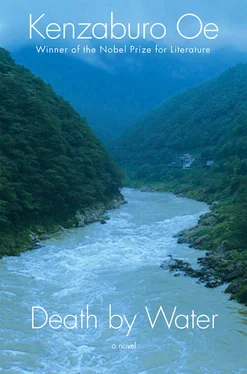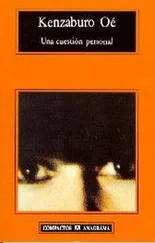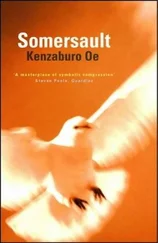Asa’s late husband (a school principal) came from a farming family, and after he died she had thrown herself into raising vegetables on a scale far beyond the normal family garden. During that brief phase, she had often mailed boxes of fresh vegetables to me in Tokyo. Now she said, as we hiked up the hill, “This strain of tomato really is exceptionally sweet and meaty. I remember once, after he had delivered a batch to a hotel in Matsuyama, Daio told me his tomatoes were being used to make gourmet salads in the hotel restaurant, along with some kind of extra-special romaine lettuce.”
“Mm-hmm,” I said.
“Of course, when Daio starts a new project, he tends to become obsessive about it,” Asa went on. “Right now he’s totally focused on cultivating these high-end tomatoes. Some of the children of his old disciples, after moving away to Osaka and Yokohama, have even come back here to work. Maybe their parents called them home, but anyhow, Daio was saying that at any given time there are four or five young apprentices on the premises, learning how to raise prize tomatoes and so on.”
“Mm-hmm.”
We both knew that Asa’s compulsive chattiness and my disinclination to reply sprang from an identical concern about the current situation, and the polarized dynamic continued as we trekked up the long hill. At last the buildings of the training camp came into sight, looking just as they had when I’d come to visit one weekend as a high school student, accompanied by my classmate and future brother-in-law, Goro Hanawa, and a young officer named Peter, who was stationed in Matsuyama as a language officer during the Occupation. The main building, which included a bathhouse with mineral-rich water piped in from a nearby hot spring, was completely dark, but the lights were ablaze in a two-story building on a hillock to the left. Farther into the complex, there was a bungalow that (as I recalled) housed a gloomy office; its curtains were drawn, but some light was leaking out. Daio emerged from the front door and headed our way. He obviously recognized Asa and me, even from a distance, and he began speaking even before we were fully illuminated by the beam from his flashlight.
“Asa, Kogito, I’m so sorry you had to get dragged into this,” he said. “Unaiko and her uncle, Mr. Koga, are up there in the office, waiting for you to arrive. As you know, he’s the husband of Mrs. Koga, whom you met the other day when Unaiko was airing some of her past grievances. You may remember that the aunt mentioned her family’s desire to vet the script for any references to their, um, history. I know this goes far beyond the call of duty, but Unaiko was saying that if you could stand by and listen while both sides present their cases …”
“If it’s a simple matter of revising the playscript, why did you have to create such a melodramatic brouhaha?” I asked sharply. “And who on earth decided to involve Akari in this absurd situation? That is completely unforgivable.”
“I know, that’s what I kept saying, but … I hope you’ll understand that I was pressured into acting against my better judgment. Forgive me, Kogito? Please?”
While Daio was stammering this apology in a particularly craven and obsequious manner, it struck me that his demeanor on this night was very different than during his visits to the Forest House. Yet even as those borderline-servile protestations of regret were streaming from his mouth, I seemed to sense a new forcefulness — you might even say authority — in his bearing.
“I think it’s absolutely despicable,” Asa fumed. “I mean, not only did that dreadful man practically kidnap Akari and Ricchan, he was even making threats like some two-bit gangster, saying something awful would happen to Akari if we got the police involved. We can talk later on about the part you’ve played in this reprehensible scenario, Daio. Right now, first things first. Where are Akari and Ricchan? I’ve brought Akari’s evening meds and a change of underwear, along with a light supper of sandwiches and so on. It sounds as if my brother needs to go and talk to this Mr. Koga you mentioned, but I would like to see with my own eyes that Akari is safe as soon as possible. Could you please take me to the place where my nephew is being held? If you’re too busy, I see some big lugs lurking in the shadows, watching every move we make. Please tell one of them to make himself useful!”
Daio didn’t reply to Asa’s impassioned screed. He simply ordered one of the young men hovering nearby — who, unlike the suit-wearing hulks we had met down by the carport, looked as though they might be farmers — to grab Asa’s Boston bag and take her where she wanted to go. Then Daio led me up the cobblestoned path to the office, with his small electric flashlight showing the way. The chilly, moisture-laden night air, which seemed to be closing in around us, made me shiver. Yet I also felt a sudden sense of clarity, as though Asa’s angry tirade had jolted me out of shock and into a more rational state of mind.
With his usual one-armed dexterity, Daio turned the knob and opened the door. After stepping halfway inside, he used his head to nudge aside a heavy-looking old curtain that covered the opening. As we entered the room, which was lit only by a low-hanging bulb, there was a long, narrow slab of hardened earth, rather like adobe, where we shed our shoes before stepping onto the wood-plank floor. Daio made a quick, deft adjustment to the electric bulb that hung from the ceiling, winching it higher so it would cast a wider pool of light.
A square table stood directly in front of us. A number of chairs were lined up on all four sides, making the smallish space feel even more cramped. Staring intently in our direction was a group of men who appeared to be perching tentatively on the chairs, as if they might need to depart at any moment. There was a woman as well: Unaiko. She had a voluminous shawl wound around her head and shoulders, which made her look somehow exotic and unfamiliar, but she didn’t appear to be particularly traumatized.
An older man stood up from his chair to let Daio squeeze by, and I knew right away that this must be Unaiko’s infamous uncle. His prominent, well-shaped nose and fleshy cheeks looked somewhat incongruous beneath a rather narrow forehead crowned with close-cropped white hair, but the glint of intelligence and perspicacity in his eyes reminded me of Unaiko. As the man glanced in my direction and gave a slight nod, those eyes showed no trace of emotion. Unaiko gestured at the empty chair beside her, which was across the table from her uncle, and I took a seat without returning the man’s perfunctory nod. He stared at his lap, plainly nonplussed that I had deliberately chosen to ignore his greeting. The chairs on either side of the door were occupied by the two men in suits whom Asa and I had seen earlier, and it was clear from their watchful demeanor that they had been tasked with stopping Unaiko if she tried to make a break for it.
Daio spoke first. “I’ll make the necessary introductions to save time. This is Mr. Koga, who believes there are elements of Unaiko’s play that could warrant a lawsuit for defamation of character. It might feel more natural to address him as ‘Sensei,’ but let’s keep it simple tonight. Mr. Koga had an illustrious career in the Ministry of Education and made significant contributions in that area. He used to hold a high-ranking position in the ministry — head of an important department — and he often used to appear on television in the news coverage of the Japanese legislature. Kogito, someone like you who has an interest in the finer points of postwar educational policies will surely remember having seen Mr. Koga on TV at some point.
“Moving along, I’m guessing most of you will have already recognized the novelist Kogito Choko, who is also well known for his outspoken views on politics and social issues,” Daio continued. “He and I go way back — his father was my mentor — and, well, one way or another, here we are today. In case you might be wondering, I’ve known Kogito since he was knee-high to a grasshopper, and that’s why I still call him by his first name. We were originally expecting Mrs. Koga to be joining us here as well — she actually came down to Shikoku earlier this week for a preliminary meeting, but the discussion wasn’t exactly productive so she decided to let her husband deal with things on his own from here on out.
Читать дальше










